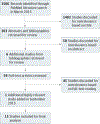Confidence Crisis Among General Surgery Residents: A Systematic Review and Qualitative Discourse Analysis
- PMID: 27603429
- PMCID: PMC6941584
- DOI: 10.1001/jamasurg.2016.2792
Confidence Crisis Among General Surgery Residents: A Systematic Review and Qualitative Discourse Analysis
Abstract
Importance: In the surgical community, there is concern that general surgery residents are choosing subspecialty training in large numbers because of a crisis in confidence at the end of training. Confidence is an essential quality of surgeons, and recent studies have attempted to quantify and measure it in graduating general surgery residents.
Objectives: To systematically review the quality of evidence provided and to critically analyze the language used to describe the findings using quantitative methods.
Evidence review: A systematic review of the PubMed indexed literature on general surgery resident confidence was performed in March 2015. A summative table of each study's hypothesis, definition of confidence, quality using the Medical Education Research Study Quality Instrument, influence using Web of Science citations, results, and conclusions was created, and qualitative coding was applied to identify emerging themes. No date restrictions were used in the search.
Findings: Fifteen survey studies have been performed that measure confidence or readiness to practice. Although 5 studies had neutral or positive conclusions, most studies reported low confidence in general surgery graduates. There are conflicting data about definitions of confidence. The relationships between confidence, autonomy, and competence are varied and complex. Comparisons with the past are frequent.
Conclusions and relevance: Confidence is difficult to define and measure. Despite limitations, survey studies are used to shape discourse and influence policies. Social and cultural factors influence self-efficacy, and focusing on operative volume and autonomy alone may not address all of the reasons that some residents express concerns about readiness to practice.
Comment in
-
Sometimes Wrong, Always In Doubt: Is There a Crisis of Confidence in General Surgery Residents?JAMA Surg. 2016 Dec 1;151(12):1176. doi: 10.1001/jamasurg.2016.2825. JAMA Surg. 2016. PMID: 27603952 No abstract available.
-
Self-Efficacy as a Measure of Confidence-Reply.JAMA Surg. 2017 May 1;152(5):507. doi: 10.1001/jamasurg.2017.0044. JAMA Surg. 2017. PMID: 28273295 No abstract available.
-
Self-Efficacy as a Measure of Confidence.JAMA Surg. 2017 May 1;152(5):506-507. doi: 10.1001/jamasurg.2017.0035. JAMA Surg. 2017. PMID: 28273296 No abstract available.
References
-
- Page DW. Surgical competence today: what have we gained? What have we lost? Southern medical journal. 2010;103(12):1232–1234. - PubMed
-
- Stain SC, Cogbill TH, Ellison EC, et al. Surgical training models: a new vision. Broad-based general surgery and rural general surgery training. Current problems in surgery. 2012;49(10):565–623. - PubMed
-
- Borman KR, Vick LR, Biester TW, Mitchell ME. Changing demographics of residents choosing fellowships: longterm data from the American Board of Surgery. Journal of the American College of Surgeons. 2008;206(5):782–788; discussion 788–789. - PubMed
-
- Eberlein TJ. A New Paradigm in Surgical Training. Journal of the American College of Surgeons. 2014;218(4):511–518. - PubMed
-
- McKenna DT, Mattar SG. What is wrong with the training of general surgery? Advances in surgery. 2014;48:201–210. - PubMed
Publication types
MeSH terms
Grants and funding
LinkOut - more resources
Full Text Sources
Other Literature Sources
Miscellaneous


